Aaron Roth – HOPE International – “Let it Shine ” – April 2012
Hi everyone, just a quick note: I’m 70% of the way through my fundraising for the next four months that I’ll be serving with HOPE International until the end of August ’12. If you’d like to be a part of the mission that I’m doing here in the Dominican Republic, you can easily donate online with a credit card, or send a check with information listed here: www.AaronRoth.net/support/
- Download this email as a pdf: Aaron Roth – April 2012 Update.pdf
- Blog and Support Page: www.AaronRoth.net
- HOPE International Worldwide – www.HOPEinternational.org
- Newsletter Archive: AaronRoth.net – Monthly Newsletters
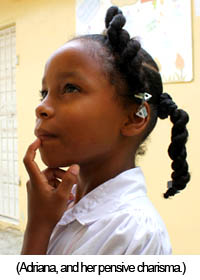
Have you ever met someone that within the first 30 seconds, you knew you were going to like them? Last week, I met a nine year old girl on a visit to one of the schools in our micro-lending program in San Pedro de Macoris. Within our program, we make loans to private schools to build classrooms or computer labs. By being a part of the Esperanza-Edify program, schools also have the opportunity to take part in business training focused on managing a school, and teacher training (www.AMOprogram) geared toward integrating Christian lessons into daily curriculum.
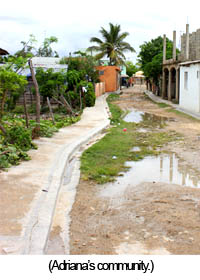 While sitting in the office with the director, I noticed a young girl peeking her head around the corner, smiling and going back to her work. I’m not sure if she was in trouble and she was being disciplined by having to sit so close to the office, but I thought I would go and investigate. As part of my responsibilities with the program, I go and work with the school administration to develop a “school profile” which entails basic school information like classrooms and number of teachers, to more in-depth information like financial situation, Christian education, and future expansion plans.
While sitting in the office with the director, I noticed a young girl peeking her head around the corner, smiling and going back to her work. I’m not sure if she was in trouble and she was being disciplined by having to sit so close to the office, but I thought I would go and investigate. As part of my responsibilities with the program, I go and work with the school administration to develop a “school profile” which entails basic school information like classrooms and number of teachers, to more in-depth information like financial situation, Christian education, and future expansion plans.
Adriana was more than happy to be my tour guide.
The first thing you need to know about Adriana, is that you better have a strong defense for making a statement, because she doesn’t believe everything she hears. The second thing you need to know about Adriana is that her smile is contagious, and if we found some way to package it up and the gleeful chuckle that follows, we could sell it to everyone who needed sunshine on a cloudy day, and surely we’d be zillionaires.
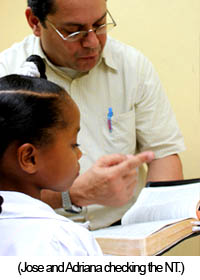 Within a few minutes of small talk, it’s clear that Adriana doesn’t believe my name’s lineage can be traced to the brother of Moses, so Jose, part of our team, goes and fetches a Bible. He flips to Numbers, and in chapter 20, we find my name displayed in the title of verse 22. “But Aaron is dead!!!” she exclaims. I am quick to point out, that “this” Aaron is still alive. She laughs, I laugh, Jose laughs. Jose adds that his name is also found in the New Testament, and just like I told you earlier, she doesn’t believe him either. But as they study the genealogy of Jesus, she yells her new discovery, “But you’re the father of Jesus!!!”
Within a few minutes of small talk, it’s clear that Adriana doesn’t believe my name’s lineage can be traced to the brother of Moses, so Jose, part of our team, goes and fetches a Bible. He flips to Numbers, and in chapter 20, we find my name displayed in the title of verse 22. “But Aaron is dead!!!” she exclaims. I am quick to point out, that “this” Aaron is still alive. She laughs, I laugh, Jose laughs. Jose adds that his name is also found in the New Testament, and just like I told you earlier, she doesn’t believe him either. But as they study the genealogy of Jesus, she yells her new discovery, “But you’re the father of Jesus!!!”
Adriana isn’t afraid of asking questions, nor of challenging people to explain their position to fill in the gaping holes in their logic. She wants to know if I’m a Christian, and I say “yes,” she says “How?” (Haha!) and when I asked her if she was a Christian, she assuredly replies that “Two years ago, when I was seven, I was baptized in the water at the beach.” I have no doubt that there may have been a theological tussle with her pastor as he led her out to the water.
With such abundant joy and vitality found in a young lady like Adriana, my mind quickly turns to a few likely outcomes for someone like her in the community where she lives. I noticed on the way in that her neighborhood doesn’t have paved streets, there are no visible places of work aside from the tiny corner stores selling basic food items, many men young and old are sitting around without jobs, 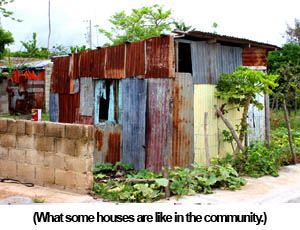 much of the houses have walls and roofs of sheet metal, and in fact, this particular community is called “Death Beach.”
much of the houses have walls and roofs of sheet metal, and in fact, this particular community is called “Death Beach.”
I know, not just from the statistics, but from people I’ve met how easy it is not to succeed in a place like this. It’s not just because of laziness or lack of opportunity. There are real and evident forms of destruction in the community. It’s almost as if the environment is actively working against those doing good. If you’re not involved in black market activities, drug sales, or prostitution, then you’re going against the grain.
These are not simple temptations. They are better expressed as “pressures.” Compare, for example, you’re on a diet and the ice cream aisle is tempting, or you’re at a friend’s birthday party where someone hands you a plate full of cake and ice cream. You can glide on by that freezer door, but a plate in your hand is much more difficult to toss away. Or compare this, seeing the new clothing your neighbors are wearing purchased with money that comes from illegal activities, to the situation where someone in your family asking you to deliver a package and accept the money when a buyer comes to the door.
This is the reality for someone like Adriana. The above mentioned activities are not mere temptations, but rather, here in this community, people actively solicit the youth to participate. One example of this comes from talking to a pastor a few months ago, when he explained to me that he has seen many teen pregnancies in the community as a result of economic pressure. 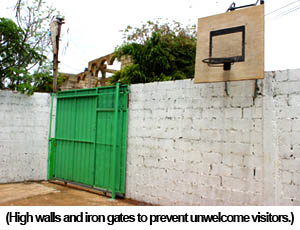 When I asked him to elaborate he says, “When a young girl doesn’t have money to pay the bus driver to go into town for work or school, he simply tells her, ‘You can pay me in different ways . . .’”
When I asked him to elaborate he says, “When a young girl doesn’t have money to pay the bus driver to go into town for work or school, he simply tells her, ‘You can pay me in different ways . . .’”
Can you imagine this being a reality for the children in your family or your neighborhood?
I find myself thinking again and again to how we can fight the rising tide of violence, drugs, and prostitution at ‘Death Beach’. How can we provide safe places for these children to grow up and live? How can we partner with schools to bring them quality education, give them access to create a world different from the one they are living? How can we continue making micro-loans and providing business training to relieve economic pressures for moms and dads? How can we continue to let the light of bright students like Adriana shine?
As we’re preparing to leave, Adriana wants to know when we’ll come back to visit.
We assure her that as part of the program, we check in with the schools regularly. Her school is deep into the series on the wisdom of Proverbs, and we’ll be back to see how the lessons are progressing. They’ll be using this curriculum for the next year and her teachers will attend our teacher training workshop in the summer. We’ll also be notifying the director and administrator of our business training coming up soon, and we’ll include them in other activities to connect them with other Christian schools in the area.
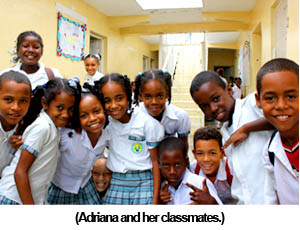 She and 20 other children wave goodbye as we drive away. To be honest with you, those hard questions are ones we wrestle with everyday, and we do have the opportunity to answer them with HOPE International and their on-the-ground partner Esperanza and Edify, and we are making real and tangible efforts in communities like this one.
She and 20 other children wave goodbye as we drive away. To be honest with you, those hard questions are ones we wrestle with everyday, and we do have the opportunity to answer them with HOPE International and their on-the-ground partner Esperanza and Edify, and we are making real and tangible efforts in communities like this one.
Thinking about children like Adriana, I do feel at peace knowing that the Spirit of the Lord is upon her, protecting her and guiding her. She wears her joy ostensibly and she shares of it freely. Her charisma makes me think of this passage:
“No one lights a lamp and hides it in a clay jar or puts it under a bed. Instead, they put it on a stand, so that those who come in can see the light.” (Luke 8:16)
and this song we sang as kids:
“This little light of mine, I’m gonna let it shine. Let it shine, Let it shine, Let it shine.”
I pray that we continue to help these lights shine brightly in the communities where we work. Please pray for that too.
Blessings to you and your family,
-Aaron
aroth@hopeinternational.org
(540) 421-8683
Skype: aprothwm05
Web: www.AaronRoth.net

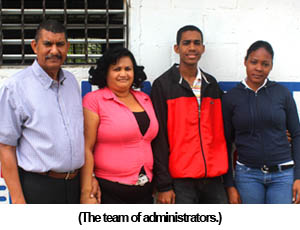
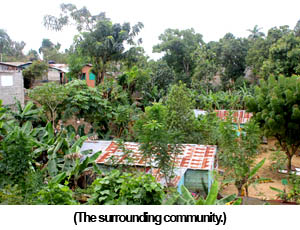 Anyway, Angel is a pastor, a father of three, and a mainstay at the school “Colegio Lubrera de Caballona” for the past three years with his team of dedicated teachers and administrators.
Anyway, Angel is a pastor, a father of three, and a mainstay at the school “Colegio Lubrera de Caballona” for the past three years with his team of dedicated teachers and administrators.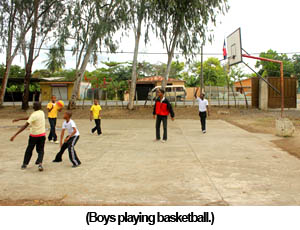 make a lot more money working at another school. Surely, there’d be better benefits, insurance, and opportunities for an annual salary raise. But “It’s worth it,” she tells me “because we have the ability to transform these children by helping them to learn, to grow, and to prepare them for the future.”
make a lot more money working at another school. Surely, there’d be better benefits, insurance, and opportunities for an annual salary raise. But “It’s worth it,” she tells me “because we have the ability to transform these children by helping them to learn, to grow, and to prepare them for the future.”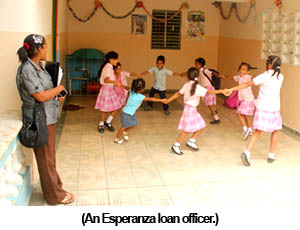 I’ve met a few of our Esperanza loan officers over the past year that have told me they’ve turned down better paying jobs because they feel called to be here, working in these communities, being a part of someone’s life, sharing from the Bible, assisting with someone’s transformation from economic poverty to self-sustainability and onto profitability. They ask me, “Where else would I have this opportunity?”
I’ve met a few of our Esperanza loan officers over the past year that have told me they’ve turned down better paying jobs because they feel called to be here, working in these communities, being a part of someone’s life, sharing from the Bible, assisting with someone’s transformation from economic poverty to self-sustainability and onto profitability. They ask me, “Where else would I have this opportunity?”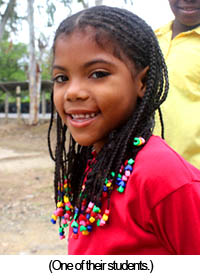 cups, a comfortable chair that adjusts, a nice laptop that was manufactured within the past two years, a bowl of fruit and plenty of natural light streaming in. Looking through the other glass pane, they see the opposite on every level, and it contains three more desks in the same space. Strangely, they choose the latter. Why?
cups, a comfortable chair that adjusts, a nice laptop that was manufactured within the past two years, a bowl of fruit and plenty of natural light streaming in. Looking through the other glass pane, they see the opposite on every level, and it contains three more desks in the same space. Strangely, they choose the latter. Why?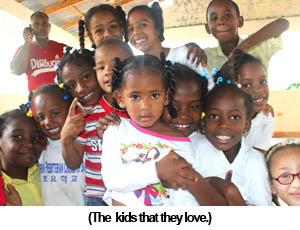 I’d like to think I’m getting more mature, and to that end I’d like to be very clear right now: this is not an opportunity for me nor for you to feel guilty. This is not a game of us and them tallying up our spiritual disciplines or accomplishments, nor of erasing our board completely. I simply want to say that we should all be inspired again by these verses:
I’d like to think I’m getting more mature, and to that end I’d like to be very clear right now: this is not an opportunity for me nor for you to feel guilty. This is not a game of us and them tallying up our spiritual disciplines or accomplishments, nor of erasing our board completely. I simply want to say that we should all be inspired again by these verses: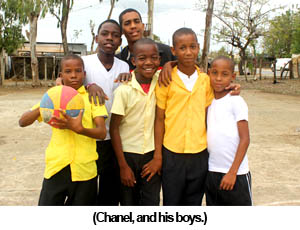 the two hands we’ve been given.
the two hands we’ve been given.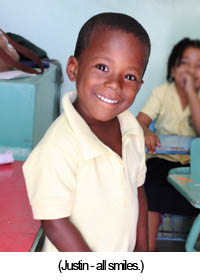 Newsletter Archive:
Newsletter Archive: 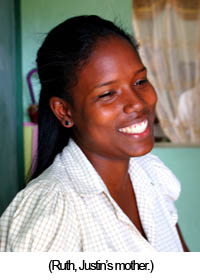 .) So that’s where he gets it from.
.) So that’s where he gets it from.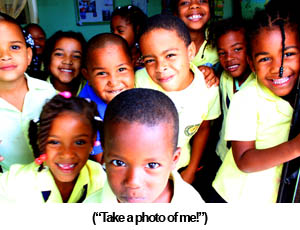 I love it. Working with these schools and their owners to help improve their businesses and their role in the community always brings joy to me. I guess it helps that kids here are like kids everywhere. Full of joy and endless wonder, ready to talk to anybody who walks through the door. At this age, they are full of innocence and possibility.
I love it. Working with these schools and their owners to help improve their businesses and their role in the community always brings joy to me. I guess it helps that kids here are like kids everywhere. Full of joy and endless wonder, ready to talk to anybody who walks through the door. At this age, they are full of innocence and possibility.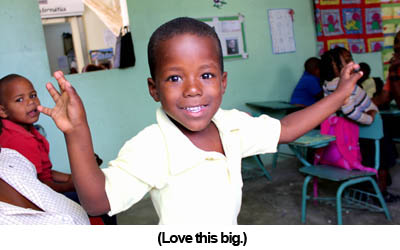
 For spectators and most costumed young men, it’s all for fun, a cultural celebration that they’ve been doing for years and years. Standing there watching the powerful swings of the rope by young, skilled, baseball-obsessed young men, I hear the squeals of girls jumping out of the way, and I’m taken back by one thing: the faces of some of these young men. They aren’t smiling. They aren’t really having a good time, are they? Their eyes don’t show celebration, nor revelry in being part of a parade, but simple determination to strike someone else, someone who may or may not deserve it.
For spectators and most costumed young men, it’s all for fun, a cultural celebration that they’ve been doing for years and years. Standing there watching the powerful swings of the rope by young, skilled, baseball-obsessed young men, I hear the squeals of girls jumping out of the way, and I’m taken back by one thing: the faces of some of these young men. They aren’t smiling. They aren’t really having a good time, are they? Their eyes don’t show celebration, nor revelry in being part of a parade, but simple determination to strike someone else, someone who may or may not deserve it.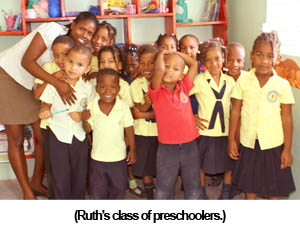 love comes in, no love goes out.
love comes in, no love goes out.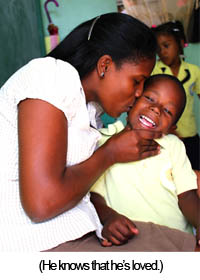 I asked her why she became a teacher here and she responded that 15 years ago she was one of the first students in a class of 50 that the director, Aleyda Torres, taught. What she received as a young girl was a good education, daily encouragement, and above all else, that she was valued and loved. Now, the school cares for over 440 students in the same way in one of the roughest areas of La Romana. Ruth continues:
I asked her why she became a teacher here and she responded that 15 years ago she was one of the first students in a class of 50 that the director, Aleyda Torres, taught. What she received as a young girl was a good education, daily encouragement, and above all else, that she was valued and loved. Now, the school cares for over 440 students in the same way in one of the roughest areas of La Romana. Ruth continues: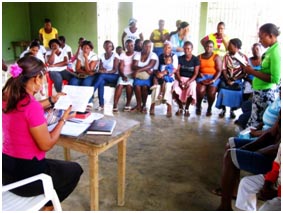 Yes, we provide small loans to individuals, but I believe, just as Ramona does, that the real work comes in the relationships we build. The real work of Hope is forged in friendships, in conversations, in prayers, in walks to and from home. I have met hundreds and hundreds of people that rely on our financial and educational services, and they are incredibly grateful for our partnership as we work together to overcome the crushing force of poverty. Quite often we are the only organization that travels to these remote communities to visit them because HOPE believes in this work, and I do too.
Yes, we provide small loans to individuals, but I believe, just as Ramona does, that the real work comes in the relationships we build. The real work of Hope is forged in friendships, in conversations, in prayers, in walks to and from home. I have met hundreds and hundreds of people that rely on our financial and educational services, and they are incredibly grateful for our partnership as we work together to overcome the crushing force of poverty. Quite often we are the only organization that travels to these remote communities to visit them because HOPE believes in this work, and I do too.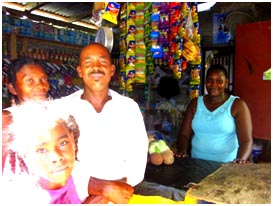 This is not the reality for the rest of the world. I’ve sat in bank meetings and spoken with our clients of HOPE about the consistent challenges of trying to provide three meals a day for their children, the expensive costs of going to clinics for medicine (usually just a few dollars), and saving enough money to send them to good schools (about $7-9 a month). They have told me, that simply by me being present with them, working with them directly and also with the people who sent me – you, my friends, my family, my church – it is an honor for them, and our work makes tangible improvements in their lives and makes them feel connected to the communities where they live.
This is not the reality for the rest of the world. I’ve sat in bank meetings and spoken with our clients of HOPE about the consistent challenges of trying to provide three meals a day for their children, the expensive costs of going to clinics for medicine (usually just a few dollars), and saving enough money to send them to good schools (about $7-9 a month). They have told me, that simply by me being present with them, working with them directly and also with the people who sent me – you, my friends, my family, my church – it is an honor for them, and our work makes tangible improvements in their lives and makes them feel connected to the communities where they live.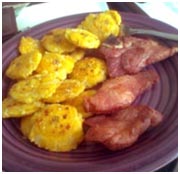
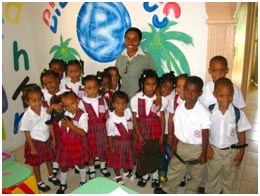 As I have mentioned in my monthly newsletters, I have been working in the area of educational program for Christian schools throughout the island of the DR. My role with HOPE in 2012 will be to continue to work in the partnership with Esperanza Internacional and a Christian Microlending organization called Edify to help build more classrooms and computer labs in Christian schools throughout the poorest communities in the DR.
As I have mentioned in my monthly newsletters, I have been working in the area of educational program for Christian schools throughout the island of the DR. My role with HOPE in 2012 will be to continue to work in the partnership with Esperanza Internacional and a Christian Microlending organization called Edify to help build more classrooms and computer labs in Christian schools throughout the poorest communities in the DR.
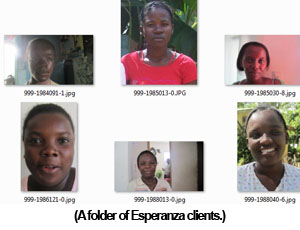 So, as I was working on this project last week I was thinking about these people that we serve; and I was doing it rapidly. With the new launch of Esperanza’s web site:
So, as I was working on this project last week I was thinking about these people that we serve; and I was doing it rapidly. With the new launch of Esperanza’s web site: 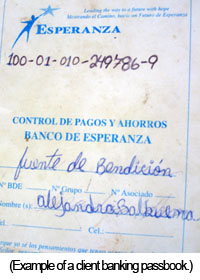 “Well, it usually means they emigrated here from Haiti.”
“Well, it usually means they emigrated here from Haiti.”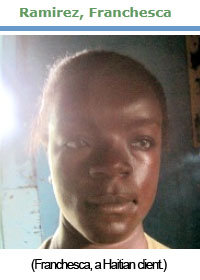 Her name is Franchesca Ramirez and she is a member of the community banking group called Bendiciones de Dios (Blessings from God). She’s my age, married, and has two children. Her microloan was for $160 dollars over six months for her small business of selling clothing in her local community. Immediately, a story fills in the details of her life, much like that light in the background fills up the room where she sits.
Her name is Franchesca Ramirez and she is a member of the community banking group called Bendiciones de Dios (Blessings from God). She’s my age, married, and has two children. Her microloan was for $160 dollars over six months for her small business of selling clothing in her local community. Immediately, a story fills in the details of her life, much like that light in the background fills up the room where she sits.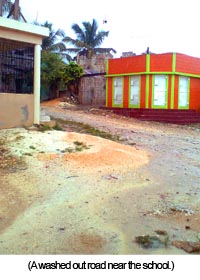
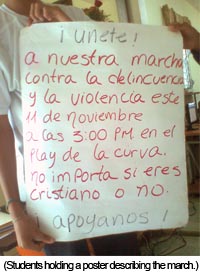 two o’clock. The director greeted me. Two hundred students were missing from school that afternoon. “Maybe it’s the rain?” I asked. The director responded, “Maybe, but there’d at least be a few.” “Well maybe there’s an event going on that we don’t know about?” That was just a wild guess, I don’t know the local community news.
two o’clock. The director greeted me. Two hundred students were missing from school that afternoon. “Maybe it’s the rain?” I asked. The director responded, “Maybe, but there’d at least be a few.” “Well maybe there’s an event going on that we don’t know about?” That was just a wild guess, I don’t know the local community news.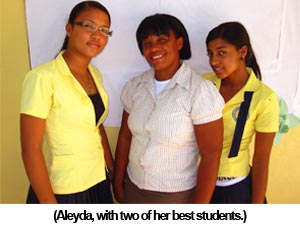 The director, Aleyda Torres, follows up with a comment that while the students are missing this afternoon that some students haven’t been coming to school for the past two months. “Why?” Their parents don’t have the money for tuition. They are waiting until they get paid double in December and the students will come back to school.”
The director, Aleyda Torres, follows up with a comment that while the students are missing this afternoon that some students haven’t been coming to school for the past two months. “Why?” Their parents don’t have the money for tuition. They are waiting until they get paid double in December and the students will come back to school.”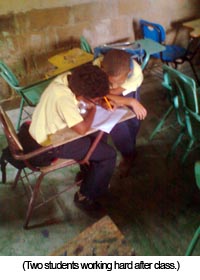 Aleyda begins to tell me about her great journey walking with the Lord and how he’s provided for her in the most difficult of times. To her, this downpour isn’t a big deal. In fact, her school has survived a hurricane in its history. The Lord brought tarps and teams of people to rebuild. She moves onto talking about what it’s like to be in charge of 440 students. She talks about wanting to exchange the tendencies to violence for more productive activities like music, sports, and studies. “Only the Lord can really change the heart of these students, you know?” She relies on the wisdom of the Lord and imparts this verse to her students frequently. “I like to keep Proverbs 3: 5-6 in mind when I talk to our students about making decisions:”
Aleyda begins to tell me about her great journey walking with the Lord and how he’s provided for her in the most difficult of times. To her, this downpour isn’t a big deal. In fact, her school has survived a hurricane in its history. The Lord brought tarps and teams of people to rebuild. She moves onto talking about what it’s like to be in charge of 440 students. She talks about wanting to exchange the tendencies to violence for more productive activities like music, sports, and studies. “Only the Lord can really change the heart of these students, you know?” She relies on the wisdom of the Lord and imparts this verse to her students frequently. “I like to keep Proverbs 3: 5-6 in mind when I talk to our students about making decisions:”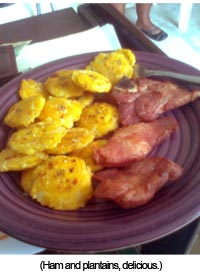 Aleyda has built her foundation on a solid rock in such a shaky place like this. With the violence and unrest in a poor neighborhood, the tremendous downpours, the lack of government assistance in the schools, and not to mention trying to keep order in a school of 440 kids, she’s got a lot on her mind. But somehow she is at peace. She’s more concerned with the immediate, she checks again to see where we are with the food.
Aleyda has built her foundation on a solid rock in such a shaky place like this. With the violence and unrest in a poor neighborhood, the tremendous downpours, the lack of government assistance in the schools, and not to mention trying to keep order in a school of 440 kids, she’s got a lot on her mind. But somehow she is at peace. She’s more concerned with the immediate, she checks again to see where we are with the food.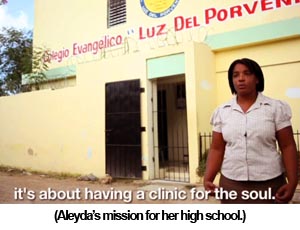 amount. She is, by all sense of the words, an entrepreneur and a dynamo.
amount. She is, by all sense of the words, an entrepreneur and a dynamo.
 This particular case with the man mentioned above was like many of the 115 patients we saw that day and the 110 the day prior. Most of the patients had significant pain in their stomach and were unable to eat well, or if at all. It was the hardest thing to look into the eyes of a child when he says to you “My tummy hurts.” And he rubs his stomach trying to make it better. Doctor VanLue’s reassurance was comforting, and we were able to give every family that walked through the door the medicine to kill the parasites, and spent time talking with them about proper food preparation and the importance of clean water.
This particular case with the man mentioned above was like many of the 115 patients we saw that day and the 110 the day prior. Most of the patients had significant pain in their stomach and were unable to eat well, or if at all. It was the hardest thing to look into the eyes of a child when he says to you “My tummy hurts.” And he rubs his stomach trying to make it better. Doctor VanLue’s reassurance was comforting, and we were able to give every family that walked through the door the medicine to kill the parasites, and spent time talking with them about proper food preparation and the importance of clean water. She’s been a microfinance client for six years. She and her husband run a successful business selling fruit to the local community. He’s currently working the double-shift so she can take children to the clinic that we brought into the mountains. I guess I’m taken aback at this situation. Normally, if I would have seen this woman during a microfinance meeting it’s all business, smiles, and a few prayer requests, much like a weekly small group Bible Study meeting. But its different now, she’s let me in to her life because I’m the doctor for the day. She tells me that two of her daughters may have Sickle Cell Anemia, a red blood cell deficiency that can be deadly later on in life. Doctor VanLue tells me that this is difficult to treat in the States, hopefully they just have Anemia, which is a much less dangerous illness caused by poor nutrition.
She’s been a microfinance client for six years. She and her husband run a successful business selling fruit to the local community. He’s currently working the double-shift so she can take children to the clinic that we brought into the mountains. I guess I’m taken aback at this situation. Normally, if I would have seen this woman during a microfinance meeting it’s all business, smiles, and a few prayer requests, much like a weekly small group Bible Study meeting. But its different now, she’s let me in to her life because I’m the doctor for the day. She tells me that two of her daughters may have Sickle Cell Anemia, a red blood cell deficiency that can be deadly later on in life. Doctor VanLue tells me that this is difficult to treat in the States, hopefully they just have Anemia, which is a much less dangerous illness caused by poor nutrition. The mom of seven looks at me and knows that my countenance has changed, she asks me what’s wrong. I tell her that it’s raining and I want it to stop so that we can see everyone who came here. I don’t want our team to be in danger trying to leave the mountains. She reassures me, “Doctor, it’s the Lord that brought the clinic to us today, and it’s the Lord that’ll take you back home.”
The mom of seven looks at me and knows that my countenance has changed, she asks me what’s wrong. I tell her that it’s raining and I want it to stop so that we can see everyone who came here. I don’t want our team to be in danger trying to leave the mountains. She reassures me, “Doctor, it’s the Lord that brought the clinic to us today, and it’s the Lord that’ll take you back home.” It all strikes me at the same time. The two daughters with Anemia. The pounding rain on the roof. The women with their children waiting to see us. The muddy roads getting muddier. The smiles on the Doctor’s face and the rest of the family we just visited. The real doctor is thanking the patient for her visit. Wow. I’m amazed and inspired. It’s people like Doctor Scott VanLue, and women like the one we just visited that renew my vision for what this world can be, a world where the living God still moves and works where we think it’s hopeless.
It all strikes me at the same time. The two daughters with Anemia. The pounding rain on the roof. The women with their children waiting to see us. The muddy roads getting muddier. The smiles on the Doctor’s face and the rest of the family we just visited. The real doctor is thanking the patient for her visit. Wow. I’m amazed and inspired. It’s people like Doctor Scott VanLue, and women like the one we just visited that renew my vision for what this world can be, a world where the living God still moves and works where we think it’s hopeless.
 make sure all taxis arrive at their appointed stations according to the schedule, all the equipment is repaired, and all disputes about money, territory, and preferred clients are handled with integrity and peace.
make sure all taxis arrive at their appointed stations according to the schedule, all the equipment is repaired, and all disputes about money, territory, and preferred clients are handled with integrity and peace. nce loan officer:
nce loan officer: to the group, but they laugh. They all know me. I’ve been here before, a few times actually. They meet on Tuesdays. Ramona jokes with me that it’s only on Tuesdays that I come to visit her. In fact, my very first day of working in the field almost 10 months ago was a Tuesday, with Ramona. I think to myself. “We’re Tuesday People.”
to the group, but they laugh. They all know me. I’ve been here before, a few times actually. They meet on Tuesdays. Ramona jokes with me that it’s only on Tuesdays that I come to visit her. In fact, my very first day of working in the field almost 10 months ago was a Tuesday, with Ramona. I think to myself. “We’re Tuesday People.”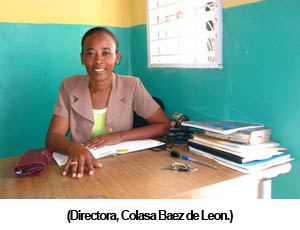
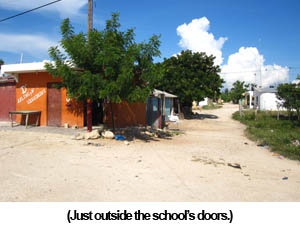 In another meeting, I commented to Ysabel Garcia Hernandez, the director of a much smaller school, “It seems to me that you really love these students.” She warmly responded, “Oh yes, of course. They are my children. If they weren’t in school, they’d be on the street.” I looked out across the dusty, rocky, unpaved road and I know she’s waiting for me to say something, but all I can do is just smile and nod in affirmation.
In another meeting, I commented to Ysabel Garcia Hernandez, the director of a much smaller school, “It seems to me that you really love these students.” She warmly responded, “Oh yes, of course. They are my children. If they weren’t in school, they’d be on the street.” I looked out across the dusty, rocky, unpaved road and I know she’s waiting for me to say something, but all I can do is just smile and nod in affirmation.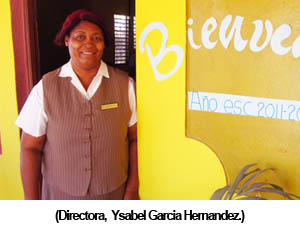 The kind of distinction I have seen here is the difference between night and day. I have realized that in communities like this, often there is not electricity, so when it’s nighttime it’s actually really dark. (Even though that observation sounds trite, think about what it felt like the last time a storm knocked your power out. It was really, really dark right?) When I had come back from this trip to the schools, I talked to a Dominican colleague in the office and tried to use a translation of the phrase “difference between night and day,” and she explained to me that normally here they’d say “The difference between Heaven and Earth. ” Hmmm, that’s interesting, I said to myself while considering these two statements:
The kind of distinction I have seen here is the difference between night and day. I have realized that in communities like this, often there is not electricity, so when it’s nighttime it’s actually really dark. (Even though that observation sounds trite, think about what it felt like the last time a storm knocked your power out. It was really, really dark right?) When I had come back from this trip to the schools, I talked to a Dominican colleague in the office and tried to use a translation of the phrase “difference between night and day,” and she explained to me that normally here they’d say “The difference between Heaven and Earth. ” Hmmm, that’s interesting, I said to myself while considering these two statements: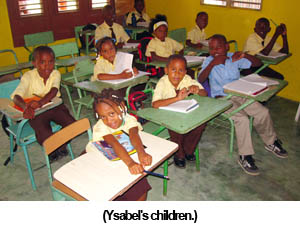 oice gets the most customers.
oice gets the most customers.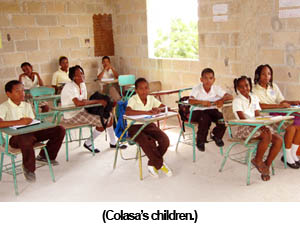 But for these women, they have a rebellious nature. They don’t believe in the hustle economy. These seemingly innocent women are clearly, and unashamedly, rule breakers. So when I asked them why they bend “the rules”, they responded:
But for these women, they have a rebellious nature. They don’t believe in the hustle economy. These seemingly innocent women are clearly, and unashamedly, rule breakers. So when I asked them why they bend “the rules”, they responded: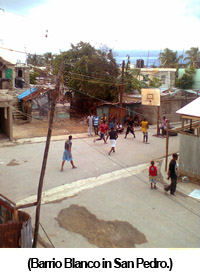
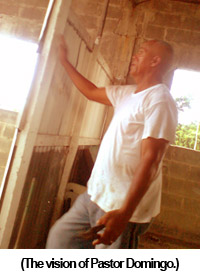
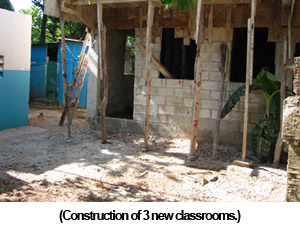
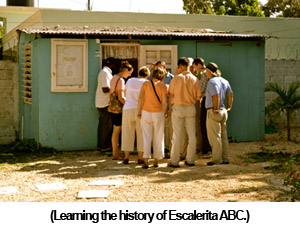 Teresa walked us over to the old school building and said that she started the school in one room with about 15 children. In those days, she didn’t know how she would be able to continue the school. She didn’t have money for desks or blackboards and had to keep the finances tightly under control to make sure the teachers got paid. When they didn’t have enough desks, she said that she had to seat children on a small bench. “Oh wait, I can show you this bench! We still use it!” She briskly walked over to a newer building and pulled out this bench. It’s like she kept a reminder of what things were like seven years ago with one building, and held onto it as a reminder of a vision come to reality. But for her, the school still runs on a tight budget so they still use it for current students! (You know, in the states we sometimes keep things for posterity sake, but in this case, she still uses it for posterior sake.)
Teresa walked us over to the old school building and said that she started the school in one room with about 15 children. In those days, she didn’t know how she would be able to continue the school. She didn’t have money for desks or blackboards and had to keep the finances tightly under control to make sure the teachers got paid. When they didn’t have enough desks, she said that she had to seat children on a small bench. “Oh wait, I can show you this bench! We still use it!” She briskly walked over to a newer building and pulled out this bench. It’s like she kept a reminder of what things were like seven years ago with one building, and held onto it as a reminder of a vision come to reality. But for her, the school still runs on a tight budget so they still use it for current students! (You know, in the states we sometimes keep things for posterity sake, but in this case, she still uses it for posterior sake.)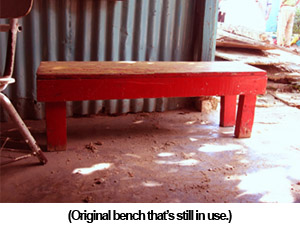
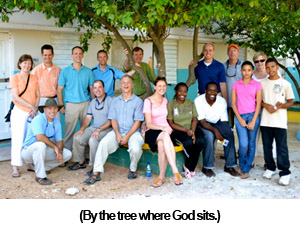 I think all of us took a moment to take in what she was saying. It’s as if she was reminding us that there are places where God calls us to sit with us, to be still and to show us, “what can be.” I think there are so many times when we are so worried about what we see or what we don’t see in front of us. Sometimes we don’t think that any of “this” can be redeemed or changed. It’s like we cannot see when our eyes open, but when we close them and seek God, He can show us a vision of what can be. He can show us the blueprints of a future community center in the midst of a struggling ghetto or a large school that teaches the poorest students of a community. It’s interesting to me that when I have these conversations with these leaders in the country, I can usually hear a local corner store play the typical Carribean Merengue, but strangely, I still find myself thinking about an Irish hymn:
I think all of us took a moment to take in what she was saying. It’s as if she was reminding us that there are places where God calls us to sit with us, to be still and to show us, “what can be.” I think there are so many times when we are so worried about what we see or what we don’t see in front of us. Sometimes we don’t think that any of “this” can be redeemed or changed. It’s like we cannot see when our eyes open, but when we close them and seek God, He can show us a vision of what can be. He can show us the blueprints of a future community center in the midst of a struggling ghetto or a large school that teaches the poorest students of a community. It’s interesting to me that when I have these conversations with these leaders in the country, I can usually hear a local corner store play the typical Carribean Merengue, but strangely, I still find myself thinking about an Irish hymn: